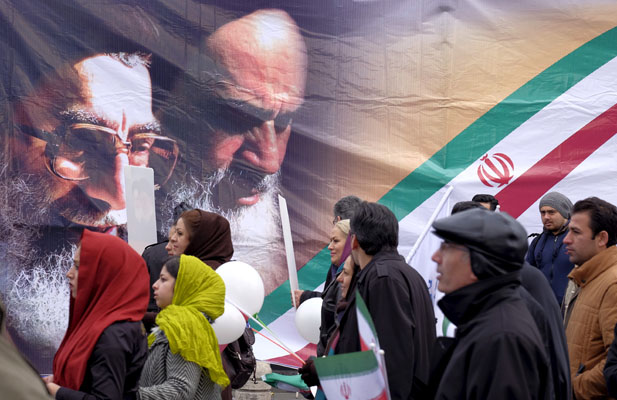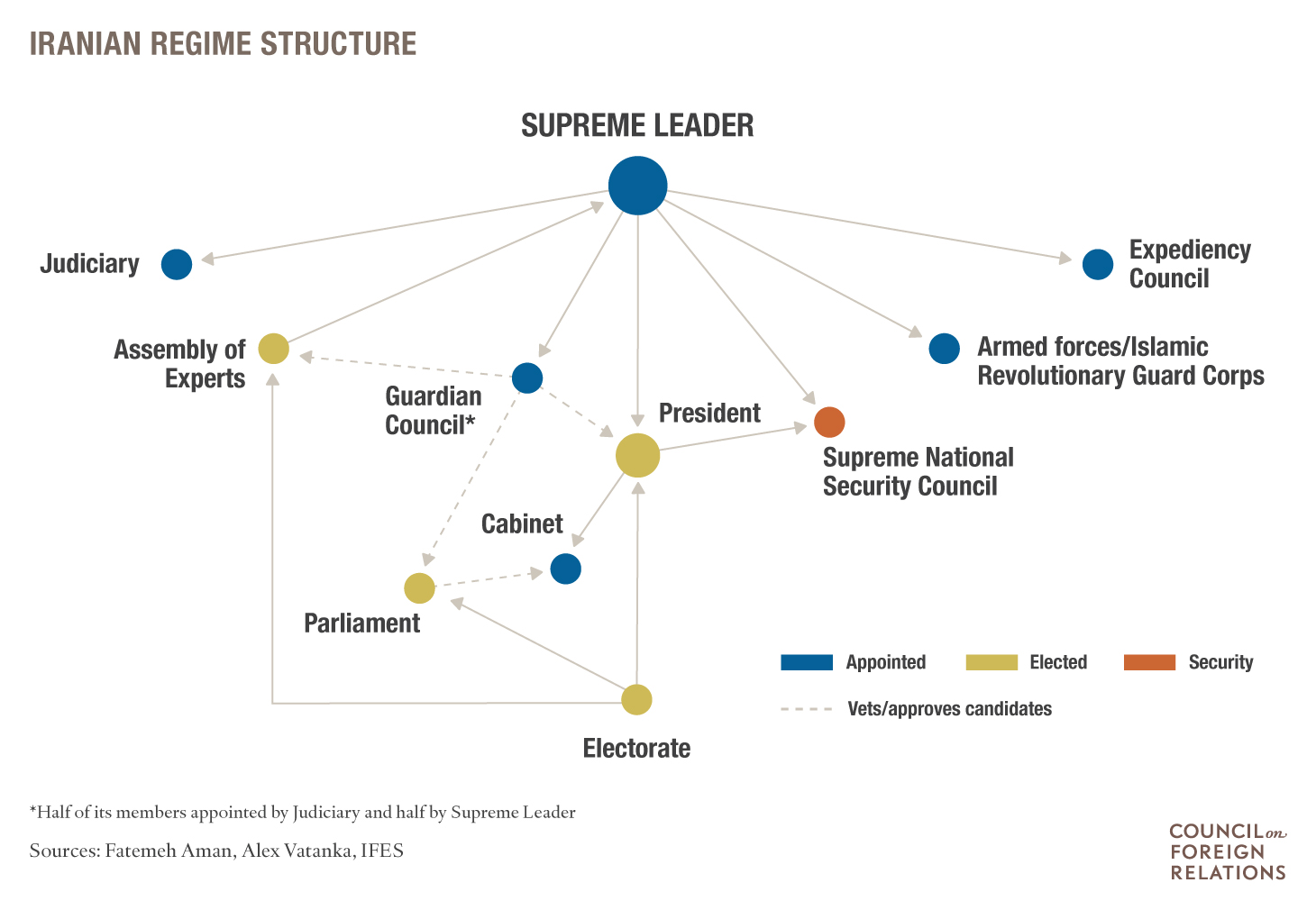Iranian Election Truths and Myths
The first national elections since the Iranian nuclear agreement will neither lead to meaningful reforms nor moderation in government policies, writes CFR’s Ray Takeyh.
February 19, 2016 5:28 pm (EST)
- Expert Brief
- CFR scholars provide expert analysis and commentary on international issues.
Iranians will go to the polls on February 26 to elect members of the 290-seat parliament and the 88-seat Assembly of Experts. A parliament that will continue to be dominated by hard-liners is thought to be an obstacle to President Hassan Rouhani’s reforms. Elections to the Assembly of Expert will be closely watched because the body will likely select a successor to the supreme leader, Ali Khamenei. The seventy-six-year-old Khamenei is persistently rumored to be in poor health.
Yet a closer look at both institutions reveals that neither election will be as meaningful as they are often portrayed in the international press. In the aftermath of elections, the parliament is unlikely to act with much decisiveness and the Assembly of Experts probably will not in fact choose the next leader, but rather, rubber stamp a selection made by unelected others.
 People walk past a picture of the late leader of the Islamic Revolution, Ayatollah Ruhollah Khomeini (right), and Iran’s current supreme leader, Ayatollah Ali Khamenei, during a ceremony marking the thrity-seventh anniversary of the revolution in Tehran. (Photo: Raheb Homavandi/TIMA/Reuters)
People walk past a picture of the late leader of the Islamic Revolution, Ayatollah Ruhollah Khomeini (right), and Iran’s current supreme leader, Ayatollah Ali Khamenei, during a ceremony marking the thrity-seventh anniversary of the revolution in Tehran. (Photo: Raheb Homavandi/TIMA/Reuters)No Time for Reforms
More on:
The dichotomy often made by foreign observers of an Iranian polity divided between hard-liners and reformers is an oversimplification. Rouhani has never been part of the reform faction as the term is properly understood in its Iranian context. The reform movement evolved in the early 1990s by calling for accountability and pluralism. The descendants of that movement were the participants in the Green Revolution of 2009, which was brutally repressed with Rouhani’s blessing (he served in the Supreme National Security Council at the time). Since the purges of 2009, Iranian politics have been reduced to a coalition of hard-liners and centrists who agree far more than they disagree. On crucial foreign policy issues, such as projection of power in the Middle East and aiding the regime of Bashar al-Assad in Syria, there is a rough consensus across the political spectrum. As such, elections are unlikely to usher in a new direction in Iran’s international relations.
The parliament has proven a boisterous but largely inconsequential debating chamber. In the complex Iranian system, the parliament’s laws can be overwritten by various institutions, such as the unelected Guardian Council, whose job is to vet legislation to make sure it conforms to religious standards. This function has regularly been abused by the Guardian Council, which has vetoed bills that have little to do with religious matters. It routinely sends budgets back to the parliament for greater deliberation even though it is unclear how they violate Islamic law.
Rouhani has faced little opposition from the parliament due to his close collaboration with the powerful speaker, Ali Larijani. Although a conservative himself, Larijani is very much a man of the system who is interested in the government functioning smoothly. The Rouhani-Larijani partnership has ensured that the firebrands in the parliament do not interfere with the executive branch’s agenda.
"On crucial foreign policy issues, such as projection of power in the Middle East and aiding the Assad regime in Syria, there is a rough consensus across the political spectrum."
In the run up to the current parliamentary elections, the Guardian Council has, predictably, disqualified hundreds of reformist candidates. In addition to overseeing legislation, the council is responsible for vetting candidates for political office to ensure their loyalty to the Islamic Republic. Even in the context of Iran’s circumscribed elections, the council’s wholesale rejection of a slew of candidates appears excessive and arbitrary. Although some of the candidates are likely to be reinstated on appeal, the council has ensured that there will be a conservative majority in the next parliament. The council is signaling to the nation that the Islamic Republic will allow only its most ardent supporters to assume any office.
More on:
A Hollow Assembly
The Assembly of Experts is another institution that looms larger on paper than in real life. An elderly clerical body dominated by conservatives, it meets periodically to listen to briefings by various officials. Its membership is controlled with as much zealousness as other elected offices.
The Guardian Council has been even more rigorous in its vetting process for the assembly than for the parliament, even denying the candidacy of Hassan Khomeini, the grandson of the founder of the Islamic Republic, Ayatollah Ruhollah Khomeini. The Guardian Council’s moves signaled that a qualified candidate must possess both theological erudition and political reliability.
"The most stark dichotomy in Iran today is not between hard-liners and moderates, but state and society."
Yet the assembly’s role as power broker is exaggerated. In any succession crisis, the assembly is more likely to provide the venue for announcing the next supreme leader than actually selecting one. The last time the Islamic Republic faced a succession was in 1989, after Khomeini’s death. At that time, backroom deliberations ensued, with Ayatollah Hashemi Rafsanjani, then speaker of the parliament, and Khomeini’s son Ahmad orchestrating the selection of the new leader. Once regime insiders settled on Khamenei they began a bizarre campaign to justify their choice. Leaders claimed, without evidence, that Khomeini had sanctioned the selection of Khamenei. Rafsanjani embellished further, claiming in an interview that in one of the supreme leader’s last meetings with the heads of the branches of government he dismissed concerns regarding his succession. In Rafsanjani’s account, Khomeini pointed to Khamenei as his most suitable successor. Then the Assembly of Experts met and, in a perfunctory session, ratified a choice already made.
Guardians of Order
"The leading actors in choosing Khamenei’s successor are likely to be the leadership of the Revolutionary Guards and the conservative clerics they look to for ideological cover."
A similar process can be expected the next time the Islamic Republic faces the prospect of selecting a new supreme leader, though Rafsanjani is unlikely to play such a prominent role. The leading actors in choosing Khamenei’s successor are likely to be the leaders of the Revolutionary Guards and the conservative clerics they look to for ideological cover. The back-room deliberations are likely to be as intense as the last time due to fears in conservative circles that a restive Iranian population, particularly the youth, will see Khamenei’s demise as an opportunity for political and cultural liberalization. The most stark dichotomy in Iran today is not between hard-liners and moderates, but rather, between the state and society. Khamenei’s passing will make the state vulnerable to an uprising or breakdown of order, a risk that the regime’s guardians, including Rouhani and Larijani, take seriously. This will lead them to quickly select a replacement, to project the impression of continuity and strength. The Assembly of Experts will play a convening role in such a succession, but not an essential one.
As Iran enters its first election cycle since the advent of the nuclear deal, what is striking is how little either the Assembly of Experts or the parliament will affect national affairs. A conservative parliament will prove cantankerous, but, under the steady hand of Larijani, a largely compliant body. And the Assembly of Experts’ mostly octogenarian clerics will meet occasionally to play a mostly ceremonial role. The Islamic Republic’s most crucial political maneuvers will continue to be managed by a cast of few—including Khamenei, Larijani, and Rouhani—as opposed to the elected institutions of government.
 Online Store
Online Store

